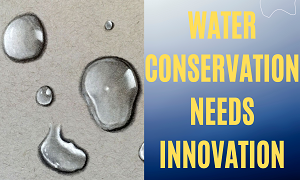16062023 Editorials, WATER CONSERVATION:
- How to innovate in water conservation
- Why is water conservation important
- What are the facts in water conservation
- Are we implementing recommended strategies
- How is society responding to this
In the last article in this series on WATER for ALL, we need to understand the presently available methods of water conservation. I remember my MOM saying try earning to your needs, however before that try learning how to save what you have, for the future.
Based on the above quote by my MOM, I realised that let us also try being innovative in conserving water. This should add to our efforts in increasing the means to make a bigger water body on this earth.
‘Water reserves are dwindling, how we should give water for all and forever. Ensuring access to water for all, indefinitely, requires a multifaceted approach that combines conservation, efficient water management, and sustainable water practices.
Now let us analyse how we could innovate in water conservation. The present scope of work is defined in the following lines. However, WANNAPRENEURS are having a free hand to devise better strategies. Ultimately one man’s dream should quench mankind’s thirst!
WATER CONSERVATION AND EFFICIENCY: Promote water conservation practices at both individual and community levels. This includes fixing leaks, using water-efficient appliances, implementing water-saving techniques in agriculture, and raising awareness about responsible water use.
RAINWATER HARVESTING: Encourage the collection and storage of rainwater for domestic and agricultural use. This can involve implementing rooftop collection systems, constructing reservoirs or tanks, and promoting the use of rain barrels.
WATERSHED MANAGEMENT: Protecting and restoring watersheds is crucial for maintaining water sources. By implementing sustainable land-use practices, such as reforestation, erosion control, and the preservation of wetlands, we can enhance water retention in the soil and replenish groundwater reserves.
RECYCLING AND REUSE: Implement water recycling and reuse systems at various levels. Treated wastewater can be used for non-potable purposes like irrigation, industrial processes, and groundwater recharge, reducing the demand for freshwater.
DESALINATION AND ADVANCED TECHNOLOGIES: Continue investing in research and development to improve desalination technologies and make them more cost-effective and energy-efficient. Additionally, exploring innovative approaches like membrane filtration, solar desalination, or forward osmosis can help expand water supply options.
EDUCATION AND AWARENESS: Promote water literacy and awareness campaigns to educate individuals and communities about the importance of water conservation, responsible water use, and sustainable practices. Empowering people with knowledge can lead to positive behavioural changes and a collective effort to address water scarcity.
INTERNATIONAL COOPERATION: Addressing global water challenges requires international collaboration. Governments, organizations, and communities should work together to share knowledge, resources, and best practices. Cooperation can also help address water-related conflicts and ensure equitable distribution of water resources.
SUSTAINABLE AGRICULTURE PRACTICES: Encourage sustainable farming techniques that optimize water use, such as drip irrigation, precision farming, and agroforestry. These practices can reduce water consumption in agriculture while maintaining productivity.
CLIMATE CHANGE ADAPTATION: Recognize the impacts of climate change on water resources and develop strategies to adapt to these changes. This can involve implementing water-efficient infrastructure, managing water storage and distribution systems, and incorporating climate resilience into water management plans.
POLICY AND GOVERNANCE: Enact robust water management policies that prioritize sustainable use, protect water sources, and ensure equitable access for all. Effective governance and regulation can help drive sustainable water practices and address water scarcity challenges.
It’s important to approach water management holistically, considering the interconnectedness of water, energy, food, and environmental systems. By adopting integrated water resource management approaches and prioritizing sustainability, we can work towards providing water for all, both now and in the future.
Please like our pages: on Facebook & LinkedIn. #Way2World brings #StartUpNews from #StartUpResources about #StartUpFounders, #Co-Founders, #WomenEntrepreneurs, #WomenLeaders, #StartUpMentors, #StartUpInnovation #StartUpIncubators, #StartUpAccelerators and #StartUpListing. The #StartUpArticles, #StartUpReviews and #StartUpStories discuss #StartUpFunding, #IndianStart-Ups their #BusinessServices along with #StartUpName and #technologyimpactness. With Inputs from the Internet – RajKishan
DISCLAIMER: The above news item is provided for informational purposes only and does not constitute professional advice, legal opinion, or endorsement by WAY2WORLD. The accuracy, completeness, or timeliness of the information contained in this news item cannot be guaranteed. WAY2WORLD or its affiliates shall not be held liable for any errors, omissions, or damages arising from the use of the information provided. Readers are advised to verify the information from multiple sources and seek professional advice before making decisions based on the content of this news item. The views and opinions expressed in this news item are those of the author(s) and do not necessarily reflect the views of the publisher or its affiliates. WAY2WORLD does not endorse or promote any specific product, service, or organization mentioned in this news item unless otherwise stated. Readers are encouraged to use their discretion and judgment when interpreting and applying the information provided in this news item.

